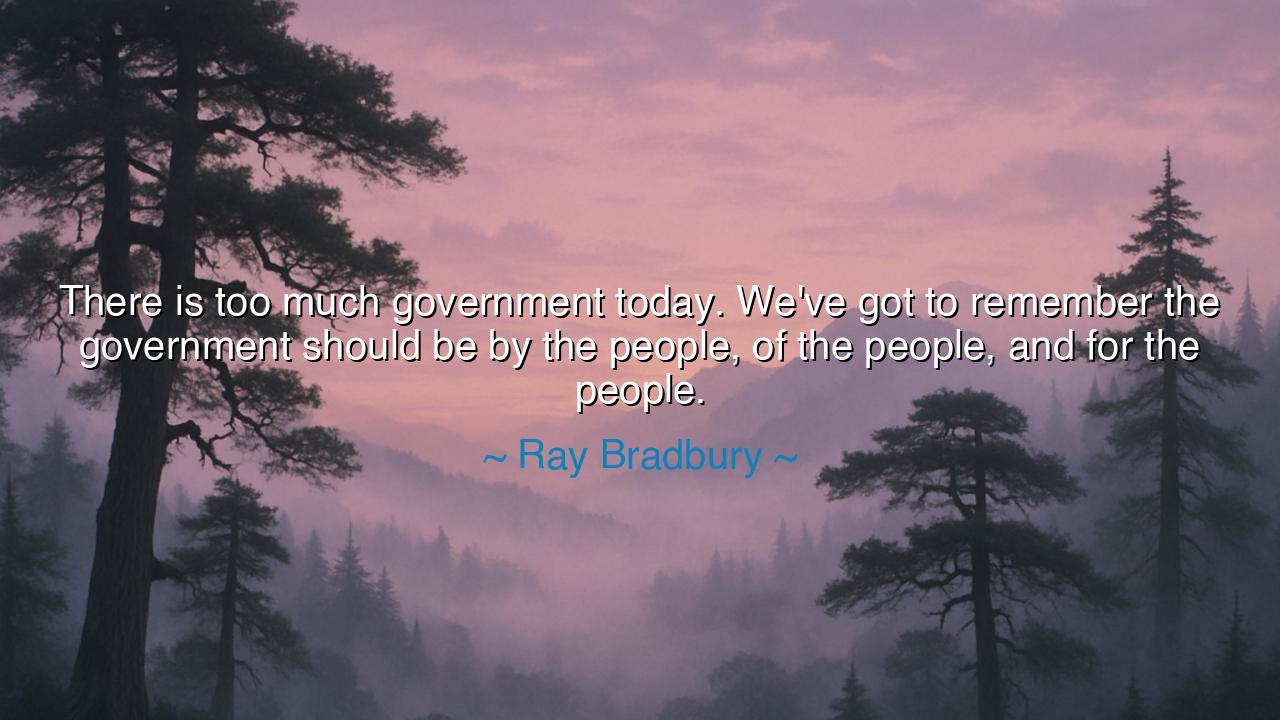
There is too much government today. We've got to remember the
There is too much government today. We've got to remember the government should be by the people, of the people, and for the people.






When Ray Bradbury declared, “There is too much government today. We've got to remember the government should be by the people, of the people, and for the people,” he was not speaking as a politician, but as a seer of freedom, a guardian of human imagination who feared the slow suffocation of individuality beneath the weight of bureaucracy. Bradbury — the author of Fahrenheit 451, a prophet of liberty and thought — saw with piercing clarity how easily power grows monstrous when it forgets its origin. His words are a cry from the heart, a reminder that government was born to serve humanity, not to master it, and that when it grows beyond the control of its creators, it becomes the very tyranny it once promised to destroy.
The origin of this quote lies in Bradbury’s reflections on modern society — particularly his disillusionment with overreach, censorship, and the erosion of personal responsibility. Living through the turbulence of the 20th century — two world wars, the rise of totalitarian states, and the birth of the surveillance age — Bradbury came to see that the greatest threat to freedom was not always the dictator with a sword, but the system that numbs the citizen into submission. His words echo the spirit of Abraham Lincoln’s immortal declaration at Gettysburg, reminding us that “government of the people, by the people, for the people, shall not perish from the earth.” Bradbury reclaims those sacred words and wields them as a warning: when power becomes distant, cold, and bloated, when it ceases to listen to the hearts of its citizens, the flame of democracy flickers in the wind.
In the style of the ancients, we might say that Bradbury was calling for the restoration of balance — for the ruler to remember that he rules not as a god, but as a steward. His lament, “There is too much government today,” does not mean anarchy; it means humility. He saw the danger of a world where regulations replaced reason, where surveillance replaced trust, and where fear replaced faith in the common man. Just as the great philosophers of old warned that liberty dies not by conquest but by complacency, Bradbury urged the modern citizen to awaken — to remember that the government is only as just as the people who guard its purpose.
History gives us endless examples of his truth. Consider the fate of the Roman Republic, which once shone as a beacon of self-governance and civic virtue. Over centuries, its senators grew comfortable, its bureaucracy swollen, and its citizens distracted. In their apathy, they traded their rights for the promise of stability. Out of that bargain rose Caesar, and with him, the slow death of freedom. What began as a government of the people became a machine above the people, and the empire that conquered the world could no longer govern itself. Bradbury, in his own time, saw the same pattern emerging — not in swords and crowns, but in data, in laws, in the slow, suffocating spread of what he called “the tyranny of good intentions.”
The emotional power of his words lies in their appeal to moral responsibility. Bradbury believed that liberty could not be maintained by laws alone; it depended upon the courage of the citizen. The people must not surrender their judgment to officials, nor their voices to systems, nor their souls to comfort. Freedom is not the absence of governance, but the presence of conscience. When citizens cease to question, when they prefer safety to self-determination, when they allow government to think for them — then the spirit of democracy dies, quietly, without fanfare.
Bradbury’s warning also carried the wisdom of restraint. He saw how modern life, driven by technology and bureaucracy, tempted humanity to trade personal responsibility for convenience. Every decision deferred to authority, every problem handed to the state, chips away at the human spirit. In his eyes, the true power of democracy is not in the government’s might, but in the character of its people. A nation governed by wise, self-reliant citizens needs little control; one governed by passive, dependent citizens invites its own oppression.
The lesson of Ray Bradbury’s words is therefore both simple and profound: freedom must be tended like a fire. Each person must guard it with vigilance, humility, and courage. Governments will always seek to grow, as vines seek the sun — but it is the duty of free men and women to prune that growth before it strangles the tree. To live as a free people is not to reject government, but to keep it honest — to remind it daily that it exists not to command, but to serve.
So, let these words be carried through time as a torch of remembrance: a government without limits becomes a master; a people without vigilance become its slaves. Let citizens rise, speak, and question. Let them remember that freedom is not inherited — it is renewed with every act of courage, every defense of truth, every demand that power answer to the people. For when the governed remember their strength, the government remembers its place — and democracy once again becomes what it was always meant to be: the servant of the soul, and not its master.






AAdministratorAdministrator
Welcome, honored guests. Please leave a comment, we will respond soon